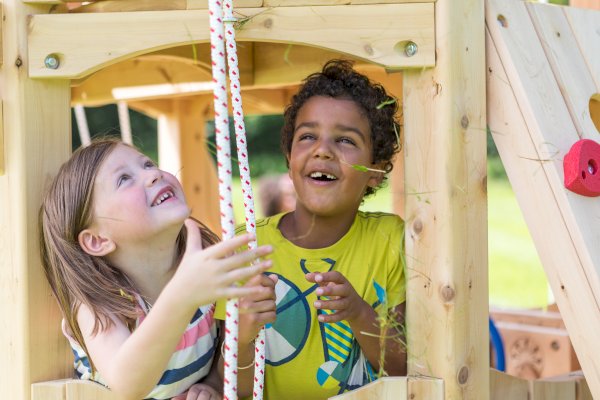Learning empathy through play
Parenting & Child Development | 4 years ago

Empathy, the ability to imagine how someone else is feeling in a particular situation and respond compassionately, is a critical skill and an important part of what makes us human. When you empathize, you identify and understand someone else’s perspective while recognizing that their thoughts and feelings may be different than your own. This is actually a very complex skill to develop, but simple social play, whether between children or between a child and adult, helps kids to learn and practice this important skill.
According to early childhood development experts at the organization Zero to Three, children who have empathy can:
- Understand the distinction between oneself and others and that other people may have different feelings and perspectives.
- Recognize one’s own feelings, and others’ feelings, and name those feelings.
- Self-regulate their emotional responses.
- Identify with the feelings of others or imagine how someone else might be feeling in a given situation. For instance the child can look at a particular circumstance such as a friend having a hard time saying goodbye to a parent and imagine how that would feel.
- Can then imagine a response that might be comforting in that situation, like sharing a favorite toy with a friend who is sad.
Empathy development begins in early childhood and continues through adolescence and beyond. The list above follows in sequence, so understanding the distinction between oneself and others must come first, with the other skills following in order, each building upon the one before. No child starts with all these skills or learns them all at once.
A child's ability to navigate the intricacies of empathy develops naturally out of the “rules” of their imaginary or social play. While engaged in a game of make believe, it is common for children to practice perspective-taking. They may pretend to be a doctor, a teacher, or a parent. When they take on these roles, they can see how their actions affect others and experience how other people may feel in different situations.
This kind of play also exposes children to new ideas and different ways of experiencing the world. Children running an imaginary store may disagree over what their store should sell. As they play, they need to work through their differences, understand how the other is feeling, and figure out a solution that everyone can accept, otherwise the game will end. Through play, they practice understanding their differences and learning from one another. In a situation like the imaginary store, some children may feel challenged by the disagreement, but with a little practice, and occasionally a little guidance from an adult, they are motivated to practice working together and develop appropriate emotional responses to disagreements or challenges because they want to keep playing.
As an adult, you can help your child learn empathy both by encouraging their play with others, and by playing with them yourself. As you play, model certain feelings or reactions, or talk about them and label them for your child. If your child won’t share, for instance, you might frown and say, “oh that makes me feel sad,” and help them see how they could make you feel better. You can also use toys or stuffed animals to help act out and describe feelings, just make sure that you keep it light and fun and don’t turn play into a lecture.
Perhaps most important, show your children empathy when they are having big feelings and help them to understand what they are feeling. “I know you’re mad that we have to leave the park. I understand. You really love playing here, but we need to go home. When we get home and you’re done feeling mad, maybe we can read your favorite book together.”
Children use play to develop confidence and communication skills, to learn to share, and to practice working together towards a common goal, building positive social relationships along the way, and learning empathy.
Play and Empathy, London Children's Museum
How does empathy develop through play? Bright Horizons
How to help your child develop empathy. Zero to Three
The power of play: building your emotional skillset, The Genius of Play
#play#children
#child-development
#parenting